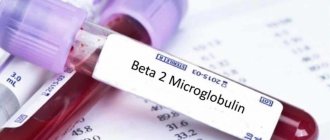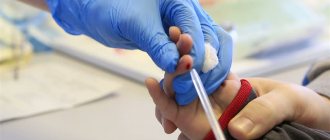Published: November 27, 2017 Updated: March 9, 2021
Hormonal imbalance can occur for a variety of reasons: due to stress, immune disorders, chronic diseases and viral infections, long-term use of hormonal medications, and even lack of sleep.
In what cases is it necessary to donate blood for laboratory tests? First of all - with an irregular menstrual cycle, heavy menstruation or pain during the cycle, as well as problems with conception. Deterioration of the skin condition - pimples, blackheads, decreased libido - are no less significant reasons to contact CITILAB for testing.
Prolactin
To determine the level of this hormone, it is important to do an analysis in the 1st and 2nd phases of the menstrual cycle strictly on an empty stomach and only in the morning. Immediately before drawing blood, the patient should be at rest for about 30 minutes.
Prolactin is involved in ovulation and stimulates lactation after childbirth. Therefore, it can suppress the formation of FSH for “peaceful purposes” during pregnancy and for non-peaceful purposes in its absence. With increased or decreased levels of prolactin in the blood, the follicle may not develop, as a result of which the woman will not ovulate. The daily production of this hormone has a pulsating nature. During sleep, its level increases. After waking up, the concentration of prolactin decreases sharply, reaching a minimum in the late morning hours. After noon, the hormone level increases. During the menstrual cycle, prolactin levels are higher in the luteal phase than in the follicular phase.
What hormones should a woman take?
Let's look at specific situations.
Obesity. There can be two reasons: endocrine and nutritional (food). In this case, the woman should take adrenal hormone tests, for example, check the level of cortisol in the body. If the tests are normal, then the cause of excess weight is food, and not hormonal. An endocrinologist may prescribe additional examination by a nutritionist, urologist, neurologist, gynecologist, and then prescribe therapy.
Dry mouth and frequent urination. These are symptoms of diabetes. In this case, the woman should take the pancreatic hormone insulin.
Excessive hair growth on the face, upper lip, male-type abdomen, chest, arms. The cause of all these troubles may be an imbalance of testosterone. Women normally have 15 times less of this hormone than men. Testosterone helps build muscle and speeds up protein synthesis.
Weakness, dry skin, hair loss are signs of thyroid pathology. In this case, give women all thyroid hormones: triiodothyronine (T3) and tetraiodothyronine (thyroxine, T4), where 3 and 4 are the number of iodine molecules, and thyroid-stimulating hormone (TSH). If this is an autoimmune disease of the thyroid gland, then we test antibodies to peroxidase.
Increased sweating . Also take thyroid hormones.
Frequent fractures . This may mean that calcium is being leached from the bones. The hormones calcitonin and parathyroid hormone are responsible for this
High blood pressure: Itzeng-Cusheng syndrome, adrenal hormones: cortisol and adrenocorticotropic hormone, which is located in the pituitary gland in order to exclude an endocrine cause of high blood pressure.
A marker for type 2 diabetes, coronary heart disease and obesity is the hormone leptin .
Let’s look at what hormones a woman should take for gynecology in a little more detail.
What to do after the examination?
If the problem is identified, you need to contact a specialist. If we are talking about gynecological pathology, you need to consult a gynecologist-endocrinologist. If problems arise in a man, then you need to consult an andrologist. Together with a specialist, the person will undergo additional research and begin appropriate therapy. Hormone therapy is a lengthy process and takes from three to six months. After therapy it is necessary to carry out monitoring.
If there are deviations from the norm in the tests, you should urgently consult an endocrinologist.
Features of analysis and preparation for laboratory research
The doctor directs you to determine the concentration of a specific sex hormone, taking into account the day of the cycle and the date of ovulation.
Before sending her for analysis, the gynecologist conducts a thorough examination of the patient, talks with her, and then decides on the need to determine the concentration of a particular active substance:
| Hormone | On what day of the cycle should I take it? |
| Progesterone | On the 22nd (with a 28-day cycle) or on the 28th (with a 35-day cycle) |
| Prolactin | Any day of the cycle |
| Estradiol | On the 7th |
| Estrogens (general) | On the 4th, repeated on the 21st |
| LH | On 3-8th or 18-22nd |
| FSH | On 3-8th or 18-22nd |
| Testosterone | On the 6th or 7th |
| hCG | Delay of menstruation up to 1 day to determine pregnancy |
They take a hormone test in a specialized laboratory. Preparation for gynecological tests for hormones involves following the following rules:
- Venous blood sampling for gynecological hormone tests is done on an empty stomach.
- You need to donate blood for analysis in the morning. The level of active substances fluctuates throughout the day, the “morning” value of active substances is considered the most accurate.
- Be sure to take into account the doctor’s recommendation on which day of the cycle to take the test.
- Before the study, exclude active loads.
- The day before blood sampling, smoking and drinking alcohol are prohibited.
- Check with your doctor for how many days you need to abstain from intimacy.
- A week before the test, stop using hormonal medications.
Reasons for taking gynecological hormone tests
The analysis must be taken at a certain phase or day of the cycle and prepared for it in a special way in order to obtain the most reliable results.
Monitoring hormonal balance in gynecology must be done not only for preventive purposes. It helps monitor the development of the genital organs and age-related changes in the ovaries. Monitor a woman’s condition during pregnancy and after childbirth.
Violation of hormone concentrations has causes and symptoms of deviation. Failures in the endocrine system must be promptly identified and treated; they cause serious diseases, the list of which is impressive.
First, it’s worth understanding what hormones are?
They are produced by certain cells of the body, which are located in special organs. These organs are called endocrine glands. In order for them to function correctly and secrete a normal amount of hormones, their work is controlled by a whole cascade of endocrine regulation organs, namely: the hypothalamic-pituitary system, peripheral glands and the pineal gland.
The hypothalamus is the highest control center for hormonal levels. A signal goes from the hypothalamus to the pituitary gland whether it is necessary or not to release hormones.
The pituitary gland secretes a secretion that can either block or stimulate the production of hormones.
The peripheral glands include the thyroid and parathyroid glands, pancreas, ovaries in women and testes in men.
The pineal gland synthesizes melatonin. It works both day and night completely independently.
when should you get your hormones checked?
By the way
As shown by a recent VTsIOM study “Women’s Health Index”, conducted among 1,200 Russian women aged 18 to 45, every fourth woman goes to the gynecologist only for illness. 55% of respondents said they would postpone a visit to the doctor, even if symptoms had already arisen, and another 11% admitted that they were ready to wait a long time until they realized that the situation was serious.
Strategy is youth. How not to be led by age Read more
Estradiol
Blood is tested for this hormone throughout the entire menstrual cycle. Estradiol is produced by the maturing follicle, corpus luteum of the ovary, adrenal glands and even adipose tissue under the influence of FSH, LH and prolactin. In women, estradiol ensures the formation and regulation of menstrual function and the development of the egg. A woman ovulates 24-36 hours after a significant peak in estradiol. After ovulation, the hormone level decreases, and a second, smaller amplitude, rise occurs. Then there is a decline in the concentration of the hormone, which continues until the end of the luteal phase.
A necessary condition for the functioning of the hormone estradiol is its correct relationship to testosterone levels.
Hormonal screening for women
The choice of hormonal screening, that is, determining which hormones to give a woman, depends on the patient’s complaints, her age and the nature of the menstrual cycle.
From the second to the fifth day of the cycle, the level of pituitary hormones is assessed, which controls the functioning of the ovaries:
- LH (luteinizing hormone);
- FSH (follicle stimulating hormone);
- prolactin;
- AMH (anti-Mullerian hormone);
- inhibin B;
- estradiol;
- progesterone
To measure ovarian hormone levels, the test is performed on the seventh to ninth day of the menstrual cycle. The analysis determines the level of estradiol, testosterone and proteins that bind these hormones: globulin and albumin.
On days 19-22, the concentration of estradiol and progesterone is checked. These hormones should be given to women.
- Estradiol is a beauty hormone; rounded body shapes, timbre of voice, delicate skin, libido depend on it; it plays an important role in a girl’s puberty.
- Progesterone. The task of this hormone is to regulate the menstrual cycle and maintain pregnancy.
If the cycle is disrupted, the procedure for taking tests is selected by the doctor individually. This service can be ordered during your stay at the Mashuk Aqua-Therm sanatorium-resort complex - we conduct research on any day of the menstrual cycle. Our gynecologists treat such problems. The sanatorium has developed treatment programs that can be combined with recreation at a medical facility.
Deviation from the norm
Gynecological tests for hormones should be deciphered by the doctor who referred you for laboratory testing. A deviation in the concentration of a substance indicates certain pathologies:
- LH ensures the normal functioning of the female reproductive system. Its high content is associated with hypofunction or polycystic ovaries, early menopause. Injuries, tumors, unbalanced nutrition, and physical overload cause a decrease in the amount of the substance.
- FSH is responsible for the secretion of estrogen and ovarian health. Delayed puberty, inflammatory processes in the genital organs, frigidity, infertility indicate a lack of this hormone.
- Estradiol is the main sex hormone in women. During menopause and menopause, its amount decreases sharply. The lack of this substance in women of childbearing age causes disturbances in the uterine cycle, dysfunction of the uterus, fallopian tubes, and deviations in the development of the genital organs.
- Prolactin is responsible for the functioning of the mammary glands, ensures their formation and growth in girls, and stimulates lactation in women in labor. A high content of this substance indicates ovarian dysfunction, autoimmune pathologies, and thyroid pathologies.
An increase in prolactin levels is associated with stress, injuries in the chest area, vitamin deficiency, and renal failure. An increase in prolactin levels occurs after abortion. An excess of the substance provokes disruptions in the uterine cycle, infertility, the formation of cysts, malignant tumors in the mammary glands, and frigidity.
A reduced level of prolactin is recorded during post-term pregnancy, as a result of taking certain pharmaceutical drugs.
- High levels of testosterone (the main sex hormone in men) cause skin problems. The norm for women of childbearing age is only 0.290-1.67 nmol/l. But to study hormonal status, testosterone concentration must be determined. Deviations from normal values can cause reproductive dysfunction in a woman.
- Thyroid-stimulating hormone is secreted by the pituitary gland and is responsible for the full functioning of the thyroid gland. The level of sex hormones depends on the amount of this substance. Metabolic processes in a woman’s body, which are controlled by the thyroid gland, provide the possibility of conceiving and bearing a child.
- Progesterone is the hormone of pregnancy; its normal course depends on it. In non-pregnant women, its high content provokes excess weight .
There are many gynecological hormone tests available. It is not always necessary to prescribe everything. After clarifying the clinical picture, the doctor makes a referral. To obtain reliable results, it is important to adhere to the rules of preparation for laboratory tests. To prescribe and interpret tests, contact only qualified specialists.







